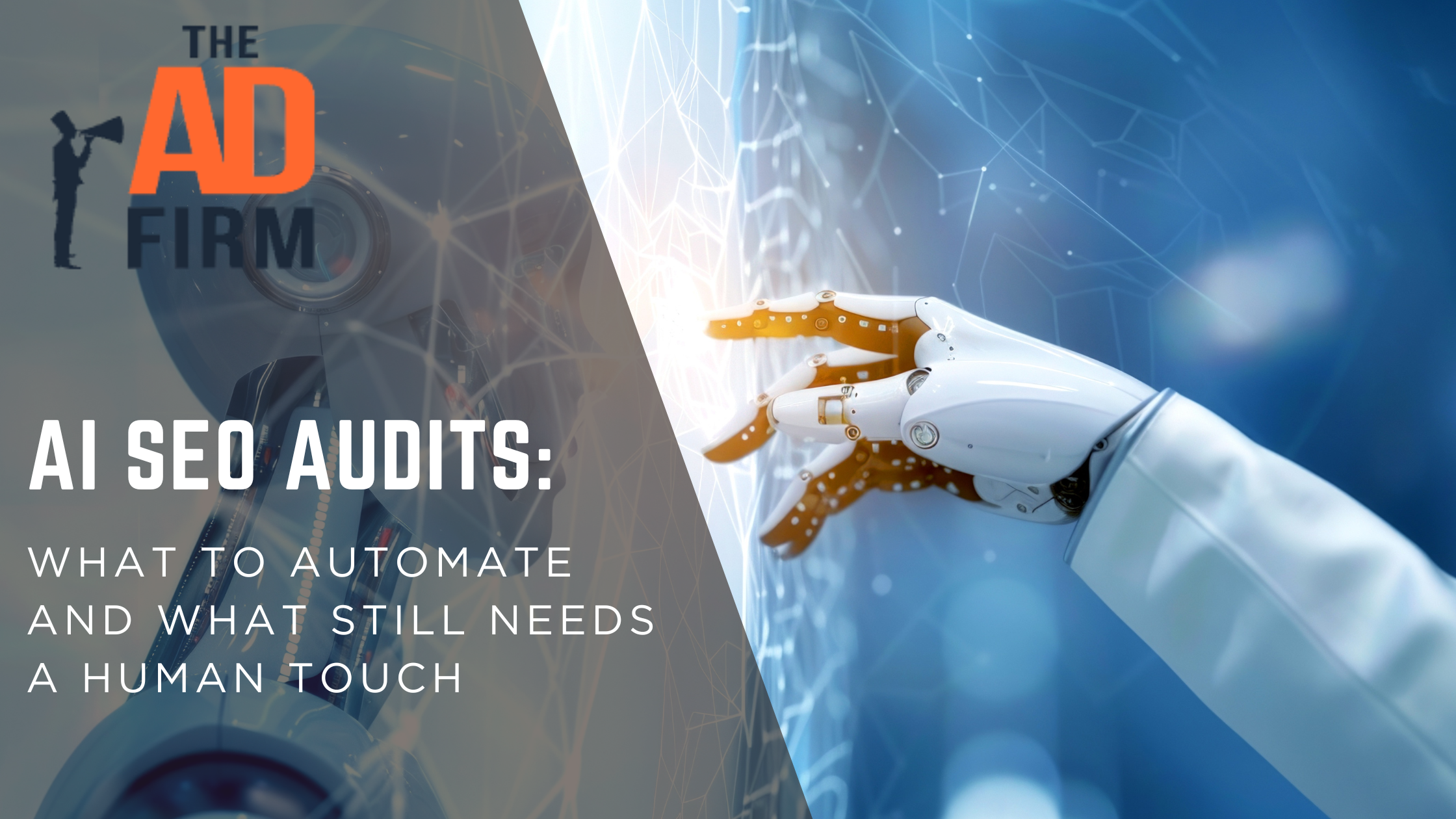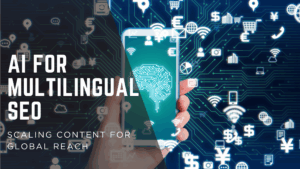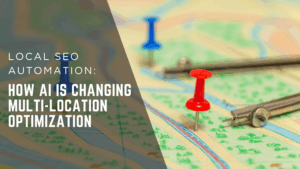AI SEO Audits: What to Automate and What Still Needs a Human Touch
Running an SEO audit can feel like chasing a moving target. There’s too much data, not enough time, and a never-ending list of technical boxes to check.
For many businesses, it’s not the lack of tools, but the hours spent digging through reports, cross-checking errors, and interpreting results that slow everything down.
Manual efforts often lead to burnout, inconsistent findings, or overlooked issues that negatively impact rankings. As a digital marketing agency, we know that smart tools only go so far.
This blog explores how AI can take some of that weight off your shoulders. We’ll outline where automation speeds things up and where your expertise still matters.
What Is an SEO Audit and Why Does It Matter
An SEO audit is a full review of your website’s structure, content, and performance in the eyes of search engines. It highlights glitches, content gaps, and external opportunities that impact rankings.
Conducting this review regularly helps you identify and resolve issues, enhance visibility, and stay current with updates in search behavior and algorithm changes.
Tasks AI Can Handle in an SEO Audit
AI SEO refers to the use of artificial intelligence tools and algorithms to streamline, automate, and enhance search engine optimization efforts. One of its strongest applications is in SEO auditing.
Instead of spending hours combing through line-by-line results, AI can handle the heavy lifting and deliver faster, more consistent output. For teams juggling multiple websites or large-scale data sets, automation offers a major advantage. There are several areas where AI SEO tools can efficiently take over routine audit tasks:
Repetitive, Rule-Based Tasks
Tasks like checking meta titles, meta descriptions, and image alt attributes across thousands of URLs follow a fixed format. AI SEO platforms can scan your entire site for missing tags, duplicate content, or metadata that’s too short or too long instantly.
These tools also flag inconsistent use of headers (H1s, H2s), missing canonical tags, and outdated schema markup. What usually takes hours of manual inspection can be completed in minutes, freeing up your team to focus on fixes rather than discovery.
Standardized Processes
AI SEO excels at automating processes that follow a set structure. For example, it can auto-generate weekly SEO reports with real-time data, trigger alerts for keyword ranking drops, or log changes in organic traffic.
Streamline Your Digital Assets with The Ad Firm
- Web Development: Build and manage high-performing digital platforms that enhance your business operations.
- SEO: Leverage advanced SEO strategies to significantly improve your search engine rankings.
- PPC: Craft and execute PPC campaigns that ensure high engagement and superior ROI.
These reports are more accurate than manual versions. Additionally, AI can monitor search visibility trends or backlink fluctuations on a set schedule, keeping stakeholders informed without extra effort.
Basic Customer Updates
Keeping clients informed is crucial, but not every update needs a person behind it. AI SEO systems can generate automated audit summaries, highlighting changes in site health, or improvement areas.
These updates can be shared via dashboards, email, or integrated chatbot responses. For agencies, this offers a scalable way to maintain transparency while focusing human effort on strategic discussions.
Technical Checks
AI tools can run comprehensive scans for issues that impact performance. This includes identifying redirect chains, HTTPS issues, improper canonicalization, and JavaScript rendering errors. Unlike a manual review, AI SEO software can instantly crawl thousands of pages and flag problems in real-time, often with suggested fixes.
Speed Reports and Core Web Vitals
Page speed is a critical ranking factor, and AI tools are built to measure it across devices and regions. They can pull performance data from Lighthouse, Google PageSpeed Insights, or Chrome User Experience Reports (CrUX).
AI SEO platforms can flag poor Core Web Vitals, such as Largest Contentful Paint (LCP), First Input Delay (FID), and Cumulative Layout Shift (CLS), and track them over time, allowing for proactive optimization.
Crawl Error Identification
When search engines can’t reach certain pages, those pages won’t show up in search results. This can happen when links are broken, pages are disconnected from the rest of the site, or access settings are too strict. AI can scan your site and list every issue in one place, so you know exactly which pages are being missed and what needs fixing.
Also Read: Local SEO Automation: How AI Is Changing Multi-Location Optimization
Where Human Insight Is Still Essential
An SEO company may use tools for fast data checks, but real value comes from people who know how to read between the lines. When audits call for deeper understanding, human judgment leads the way. AI falls short in areas that rely on context, creativity, or emotional understanding, such as:
- Tone and branding alignment: It’s not enough for content to be optimized; it has to feel right. Machines can’t always sense when language sounds off or when messaging strays from your brand’s voice. Human input ensures your tone stays consistent and speaks directly to your audience, building credibility with every line.
- Creative direction: Strong SEO goes beyond keywords. It shapes how your business is positioned through content structure, voice, and flow. Creative changes like reworking headers or adjusting storylines can make your message clearer and more compelling. These refinements require human creativity, not just templates.
- Client communication and trust: Audits are meant to be understood by people. Skilled consultants know how to explain what’s working, what’s not, and why changes matter. Real connection is built through open dialogue, honest feedback, and guidance that helps clients make confident decisions.
- Ethical decisions: Automation may highlight opportunities, but it can’t weigh long-term risks. Whether it’s respecting user privacy or avoiding short-term tricks, ethical calls require a person who understands the full picture. That insight helps businesses grow responsibly and avoid actions that could harm trust or rankings.
- User experience decisions: A fast-loading site might still confuse users. Metrics alone don’t tell the full story. Human reviewers can spot awkward flows, mismatched calls to action, or friction points that slow visitors down. These insights are critical when optimizing for actual behavior, not just page speed.
- Search intent alignment: Ranking for a term doesn’t mean the content satisfies the user. Tools list keywords, but people assess whether the content truly answers a need. Is the page helpful? Does it guide the user? Does the format support the goal? These answers rely on instinct and context.
- Competitor analysis with perspective: Seeing what others are doing is easy. But figuring out what your brand should do differently takes thought. Raw data won’t tell you how to stand out, it takes strategy and interpretation. A human-led analysis can shape a plan based on your brand’s voice, values, and strengths.
- Complex problem-solving: Some site issues aren’t black and white. Maybe rankings dropped, but there’s no clear technical fault. These cases often require analyzing patterns, connecting signals across multiple tools, and drawing conclusions from analytics, structure, and content. An SEO consultant brings the experience to spot inconsistencies, identify the root causes, and interpret data with seasoned judgment.
Best Tools for Running an AI-Assisted SEO Audit
Running a strong SEO audit today means knowing which tools actually help, and which just pile on data. The best ones do more than spit out numbers; they help you spot real problems and find clear fixes.
Amplify Your Market Strategy with The Ad Firm
- PPC: Master the art of pay-per-click advertising to drive meaningful and measurable results.
- SEO: Elevate your visibility on search engines to attract more targeted traffic to your site.
- Content Marketing: Develop and implement a content marketing strategy that enhances brand recognition and customer engagement.
These tools combine smart automation with useful features that help you understand how your site performs, what’s slowing it down, and where content or structure needs work. Whether you’re checking backlinks, or improving keyword use, the tools below are built to guide smarter decisions.
- Screaming Frog: Screaming Frog is one of the most reliable tools. It scans your website the way search engines do and reveals key structure issues like duplicate content, or missing metadata. This tool helps you understand how pages are connected and where important fixes are needed.
- Ahrefs: Ahrefs offers deep insights into your backlink profile, keyword performance, and content gaps. Its AI features help you spot trends, such as which pages are gaining or losing traction. It also identifies opportunities to improve rankings by comparing your site to higher-performing competitors.
- SEMrush: SEMrush brings together data on content, and paid performance in one easy-to-use dashboard. It automatically audits your website, flags errors, and provides recommendations. You can also use it to track keyword rankings, research competitors, and manage campaigns more efficiently.
- Surfer SEO; Surfer SEO focuses on content optimization. It analyzes your content and compares it against top-ranking pages to suggest improvements. You get a real-time score and AI-generated recommendations on word count, headings, and keyword usage, helping you match search intent without overdoing it.
- Sitebulb: Sitebulb is known for its visual reporting. It turns your site’s architecture into clean diagrams, making it easy to spot weak spots. The tool also prioritizes issues based on impact, so you can focus on changes that will move the needle. It’s great for both technical teams and marketers who want clarity.
When AI SEO Audits Fall Short
AI tools can process large data sets quickly, but speed doesn’t always mean accuracy. When automation is used alone, important context can be lost.
It’s easy to assume everything flagged is a real problem, but machines don’t always understand content intent, user behavior, or business goals. That’s why human review is still essential; it brings back the missing context and gives purpose to the data.
- False positives: Tools might flag meta descriptions, alt text, or duplicate content as errors, even if they’re performing well or serving a clear purpose. Acting on these alerts without review can lead to wasted effort or even hurt rankings.
- Context loss: AI doesn’t know your audience or your market. It can’t tell why a high bounce rate matters on one page but not another. Without understanding user intent or brand strategy, AI insights may miss the bigger picture.
- Generic fixes: Some tools recommend broad solutions like increasing word count or changing keywords without considering your niche. Following these suggestions blindly can strip away personality and weaken user experience.
These issues can be avoided by pairing AI with a thoughtful review process. It’s not about discarding tools; it’s about using them as a starting point, not the final say.
Transform Your Online Strategy with The Ad Firm
- SEO: Achieve top search rankings and outpace your competitors with our expert SEO techniques.
- Paid Ads: Leverage cutting-edge ad strategies to maximize return on investment and increase conversions.
- Digital PR: Manage your brand’s reputation and enhance public perception with our tailored digital PR services.
How to Build a Balanced SEO Audit Workflow
A smart SEO process blends automation with real-world knowledge. Machines can speed up tasks, but only people can apply insight. This approach leads to smarter decisions, better content, and improved results. Below is how you can build a workflow that gets the best of both.
- Automate routine checks: Use AI tools to scan your site for speed, broken links and crawl issues. These tasks are data-heavy, making them perfect for automation. Let the software do the heavy lifting while you reserve your time for more meaningful analysis.
- Prioritize the user journey: Think about how real people move through your site. Tools won’t always understand what keeps users engaged or what makes them leave. Combine improvements with storytelling, structure, and clarity that support your audience’s intent.
- Invest in your team’s skills: Make sure your staff understands how to work with audit tools. Train them to read reports with a critical eye and apply strategy on top of data. When your team is confident using AI without relying on it completely, the quality of your work improves across the board.
Get Accurate SEO Insights Backed by AI and Human Expertise
An SEO audit is only as good as the team behind it. While automation brings speed and consistency, it takes human insight to spot patterns, ask the right questions, and know which changes will make a real impact.
At The Ad Firm, we combine both. Our tools quickly flag issues, and keyword gaps, but our strategists go deeper, turning raw data into growth-focused plans tailored to your brand and audience.
Know what’s working, what’s not, and exactly where to go next. Contact The Ad Firm today and get insights that drive results.







